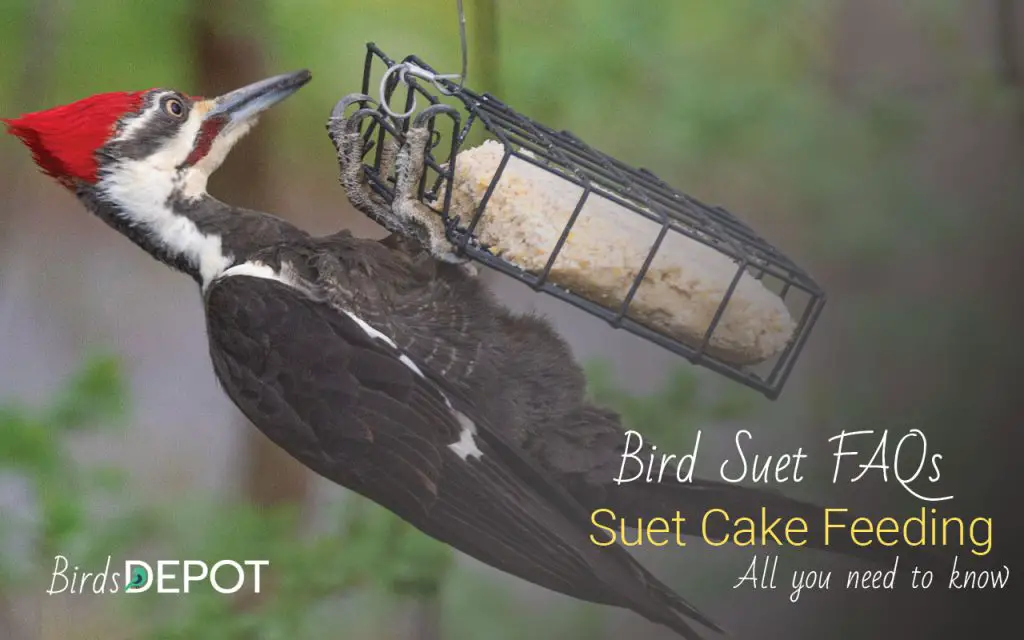Can Suet Go Bad? How long will the packaged bird suet or suet cakes last?

Suet, a dense and hard fat with a high melting point, is primarily obtained from the joints and kidneys of hoofed livestock like cattle and sheep. Birding enthusiasts commonly utilize suet as a high-calorie food source for birds, particularly during harsh winters when natural food sources are limited. Learn how long bird suet stays good and keep your feathered friends happy and healthy.
This article is a complete guide to bird suet, including its benefits, common questions answered, and expert tips on storing and maintaining its freshness. In addition, I will also give tips on how to store your package bird suet properly to make sure that it lasts as long as possible.
Does suet go bad?
Because of its properties, suet cannot handle high temperatures and can spoil if exposed to hot weather for too long. Leftovers can become contaminated and ruin the fresh suet. It’s best to give birds enough suet to finish within 1-2 days to avoid any issues.
How can you tell if bird suet is bad?
Look for the following symptoms ensuring the quality of suet provided to birds and preserving their well-being. Although birds generally avoid consuming bad suet, there is still a risk of accidental consumption during food shortages.
- Change in Texture
- Foul Odor
- Discoloration
- Presence of Insects or Pest Activity
- Mold On Suet
- Bird Disinterest
During warm weather, suet can melt and lose its solid form, becoming liquid-like. This change in texture is due to exposure to bacteria and fungi, making the suet unhealthy for birds to consume. Also, bad suet emits a strong and unpleasant odor and melted suet can foster mold growth, appearing as blackish substances on its surface. This mold poses a toxic threat to birds and can deteriorate their health.
Birds can detect when suet has gone bad. If you notice that birds are avoiding or ignoring the suet, it may indicate that it has spoiled. It’s important to check for any signs of insect infestation or pest activity, such as larvae or bugs crawling in the suet, as this indicates that the suet has become contaminated and should not be given to birds.
How long does packaged bird suet last?
The amount of time suet lasts depends on the type of suet and how it is stored. Improper storage of suet can cause it to dry out or become excessively sticky. Suet contains fat that can go rancid if not used quickly and may melt or spoil if exposed to high temperatures. If you keep packaged suet in the freezer and store it in an air-tight container, wrapped tightly in aluminum foil or plastic sheet, it can last anywhere from 6 months to a year.
Many suet cakes manufacturers claim that their suet cakes will last around three years. But, The claim isn’t valid. If you store suet cake for more than one year, it’ll spoil, and providing the cake for birds won’t be a good option.
Can suet go bad in warm weather?
Yes, suet can go bad in warm weather because it starts to spoil. The fat in the suet can go rancid, which is a sign that the suet is going bad. When it’s hot outside, your birds’ suet cake will melt and become unusable faster. If the temperature exceeds 45 degrees, including in shaded areas, it is advisable to buy suet labeled “No melt” or “Summer” to ensure it doesn’t melt under high-temperature conditions.
How to store your package suet?
Storing bird suet cakes in a cool and dry place is recommended to keep them fresh. If you wish to store them for up to a month, placing them in a Tupperware container and covering them with plastic wrap is the best option. This will preserve the freshness of the suet cake for up to four weeks. If you freeze the cake, it’s advisable to wrap it tightly in foil or plastic wrap before putting it in an airtight container to maintain its freshness for extended periods.
Suet Feeding FAQs
Why bird suet is important for birds?
How do I use bird suet effectively to attract various bird species?
What are the nutritional benefits of bird suet for birds?
Can I make my bird suet at home?
How often should I change suet?
What are the different types of bird suet available in the market?
How do I choose the right bird suet for the birds in my area?
When is the best time to offer bird suet to attract the most birds?
How do I properly store bird suet to maintain its freshness?
Are there any bird suet feeders or dispensers that work better than others?
Can bird suet attract unwanted pests, and how can I prevent it?
Are there any safety considerations when using bird suet?
What are some common bird suet feeding tips and techniques?
How long does bird suet typically last before it goes bad?
Can bird suet be used year-round or only during specific seasons?
What are some alternative options to bird suet for feeding birds?
What are the most common problems with feeding suets?
Bird suet is an affordable and easy way to feed the birds in your yard in harsh winter conditions. Again, I want to remind you that packaged bird suet will last about a year if stored in a cool place.
If I freeze suet, do I need to defrost before putting it out? Thanks
Hey Deborah,
you do not need to defrost or thaw suet when you want to serve it to birds. Plus, some experts suggest freezing the suet before filling the feeder.